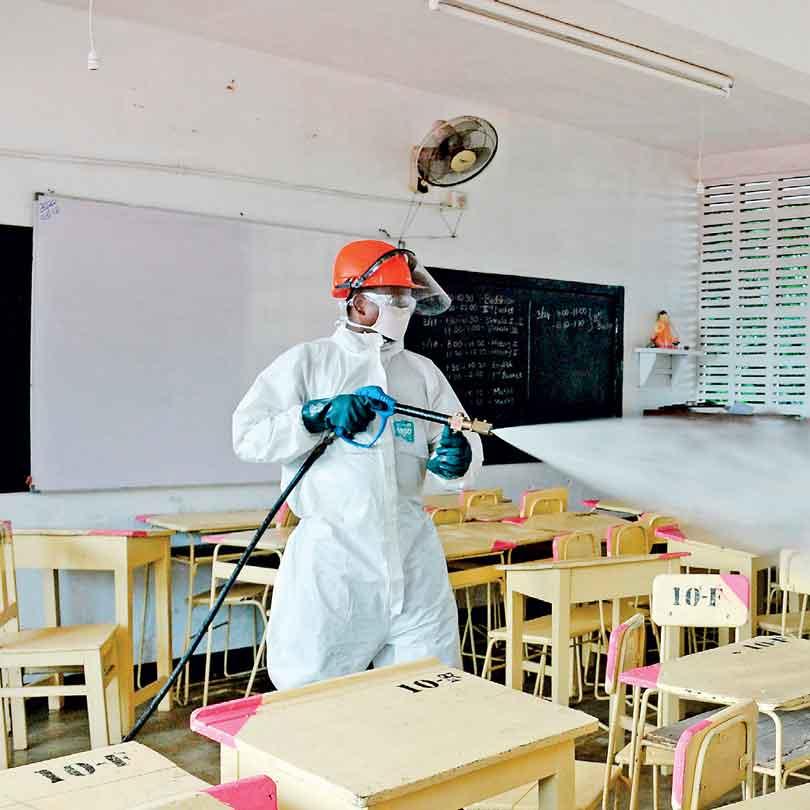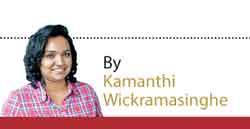Preschool teachers earning a pittance
14 July 2020 12:03 am Views - 1473

- Preschool teachers only given Rs. 250 monthly allowance during curfew period
- They also have to contribute 8% of salaries to EPF
- Teachers should be adaptive and creative

However, post-COVID, preschool teachers are demanding better compensation and a regulation within the preschool system.
The need to regulate preschools
“Since March preschool teachers have been jobless for nearly 104 days,” said Samanmalee Gunasinghe representing Vishwa Preschool Teachers Union. “Preschool teachers haven’t been entitled to the Rs. 5000 allowance either. There are around 19,440 registered preschools in Sri Lanka with over 40,000 teachers. There are nearly 500,000 preschool children with 150,000 of them qualifying for Grade 1 and this includes children from all strata of society. The preschool is where a child is familiarised into society and it’s where early childhood development begins. But it’s sad to see that preschools aren’t regulated within a formal education system. As a result the preschool teacher was forgotten during the curfew period. There have been instances when government institutions had collected their details, but that was it,” said Gunasinghe.
In addition to that they also have to contribute 8% to Employees’ Provident Fund. Some of them earn fixed amounts depending on where the preschool is registered
-Mahinda Kodithuwakku
Shedding light on the unfair treatment meted out to preschool teachers, Gunasinghe pointed out that preschool teachers have only received Rs. 750 during the past three months. “Every month they had received Rs. 250. This means their service is worth only Rs. 11.90 daily. The preschool teacher is sometimes the breadwinner in the family, sometimes they are single parents. They are indebted and don’t have a way to cover debts. In turn they’re experiencing a severe mental trauma and this is how they have lived during the curfew period,” she said.
“Until August preschool teachers have to survive. Sometimes they work for a daily wage and get something between Rs. 1000 – 2000. There’s no institution that is coming forward to take this responsibility either. Provincial councils have been dissolved, but children’s secretariats, Ministry of Women’s Affairs, Health and Education ministries have a bigger responsibility in this situation,” she added.
She further said that even if preschools reopen they have to adhere to proper health guidelines. “We have to provide children with hand sanitizers, conduct temperature checks etc. but we haven’t been provided with any of these equipment. Preschool teachers have to obtain these equipment from their own salaries but how could they do that without getting paid initially? They can’t depend on parents either. Therefore it’s the responsibility of the Ministry of Health to disinfect preschools and make them hygienic environments before they reopen,” she added.
In order to see that justice is being served to these teachers the Union has signed a petition which will be presented to the President.
Entitlement to ‘Lama Diriya’ programme
The provision of a Rs.250 monthly allowance to teachers of Preschools/Early Childhood Development Centres was allocated through the 2015 Interim Budget proposals with the aim of further strengthening the Preschool/Early Childhood Development Centre services. Accordingly, Rs.30 Million was allocated for this programme in 2017 and by the end of August 2017, Rs. 16.819 Million had been released to the relevant District Secretaries to provide this allowance to 5,499 preschool teachers. As at June 2020 this allowance is received by 7000-7200 teachers as part of the ‘Lama Diriya’ programme. “According to the eligibility criteria mentioned in Circular No :
MWCADD/CIR/2019/01 preschool teachers are selected at district level and their names are sent to the Government Agent,” said Nayana Senaratne, Director (Action), Children’s Secretariat at the Women’s and Children’s Affairs Ministry. “From there it’s sent to the Divisional Secretariat. These teachers are eligible for the Rs. 250 allowance and the allowance for four months gets deposited to their banks at once,” said Senaratne.
The circular lists a criterion comprising10 facts for a preschool teacher to be eligible for this programme. Therefore a preschool teacher should be between ages 18 and 60, should have passed the O/Ls and possess a Diploma in ECD plus preschool training, have a minimum one year work experience in case they have failed their O/Ls, the preschool should be registered at the Local Government Body for a period of one year, children shouldn’t be charged more than Rs. 1500 and so on. If the teacher is being paid by the provincial council then they aren’t eligible for this programme.
Preschool teachers haven’t been entitled to the Rs. 5000 allowance either. There are around 19,440 registered preschools. There are nearly 500,000 preschool children with 150,000 of them qualifying for Grade 1
-Samanmalee Gunasinghe
When asked whether preschool teachers who didn’t receive the allowance or the Rs. 5000 allowance would be compensated Ms. Senarathne said that these allowances were decided on by the task force. “A majority of preschool teachers didn’t receive the Rs. 5000 allowance. If a family member received this, then they wouldn’t receive it. The problem here is the category. Since they go as preschool teachers it is less likely that they would have received it. But then again, there were some who received it as well,” said Senarathne.
Discussions underway
When contacted, Education Ministry secretary N.H.M Chitrananda said that discussions are underway to incorporate preschools under the purview of the Ministry. “But it’s still at discussion stage. The salaries are issued by the respective Provincial Councils,” said Chitrananda.
Not categorised as a labourer
Accordingly, nine officers have been appointed to oversee operations regarding this issue by respective provincial councils in each of the nine districts. “Preschool teachers are underpaid and they don’t fall into the category of labour,” said Mahinda Kodithuwakku, officer appointed by the Western Provincial Council. “In addition to that they also have to contribute 8% to Employees’ Provident Fund. Some of them earn fixed amounts depending on where the preschool is registered. As such, preschools are registered at Provincial councils, urban councils, cooperative societies while different charity organisations also run preschools,” explained Kodithuwakku.
Teaching young children is such a highly specialised field requiring the necessary credentials and training in early childhood education or child development. The teacher needs to be provided with the necessary teaching environments
-Chrishara Paranawithana
Although the dates have been set to reopen preschools on August 10, the future looks uncertain.
Importance of Early Childhood Education (ECD)
“Early childhood is considered the time before the age of eight, and it is during this period that a child experiences the most rapid phase of growth and development,” opined Chrishara Paranawithana, licentiate clinical psychologist. “Their brains develop faster than at any other point in their lives, so these years are critical. The foundations for their social skills, self-esteem, perception of the world and moral outlook are established during these years, as well as the development of cognitive skills.
An ECD teacher’s role is of critical importance to encourage healthy brain development,” said Paranawithana. Paranawithana further said that since early childhood education is doubtlessly an important and fundamental stage of learning, the ECD Teachers should be trained as well as equipped with the necessary, knowledge, attitude and skills to cover these preliminary developmental foundations child. “Teaching young children is such a highly specialised field requiring the necessary credentials and training in early childhood education or child development. At the same time the teacher needs to be provided with the necessary teaching environments and facilitation,” said Paranawithana.
“When a person decides if early childhood education is the right career choice for you, the first and most important question to ask yourself is: Do I like working with children? If you can’t answer in the affirmative, then this career may not be best for you. Working with children requires patience, dedication and sensitivity. “It is important to understand that you could be one of the first adults a young child has interacted with outside of his or her own family. The separation from their parents in the beginning can be difficult, and a teacher must help them through this transition. A child can become very attached to you as a ‘substitute’ for his or her parents, or they may shun you completely. Great teachers are adaptable to the emotional reactions of their students. Furthermore, teachers in early education need to be creative and adaptive. What motivates a very young child? How do you hold a toddler’s interest? How do you make learning fun? These are all questions you will have to ask yourself,” she added.